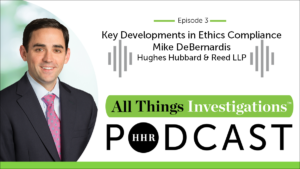Earlier this week, the Department of Justice (DOJ) and Securities and Exchange Commission (SEC) announced a Foreign Corrupt Practices Act (FCPA) enforcement action, involving the waste management company, Stericycle, Inc. (Stericycle). According to the Information and Deferred Prosecution Agreement(DPA), Stericycle entered into a three-year DPA. The company was charged with two counts of conspiracy to violate (1) the anti-bribery provision of the FCPA, and (2) the FCPA’s books and records provision. Under the DPA, Stericycle agreed to a criminal penalty of $52.5 million of which the DOJ agreed to credit up to one-third of the criminal penalty against fines the company pays to authorities in Brazil in related proceedings. According to the SEC Cease and Desist Order (Order), Stericycle violated the anti-bribery, books and records, and internal accounting controls provisions of the FCPA and agreed to pay approximately $28.2 million in disgorgement and prejudgment interest. The SEC Order also provided for an offset of up to approximately $4.2 million of any disgorgement paid to Brazilian authorities. In today’s post we will consider the bribery schemes.
The Problem
According to the Order, Stericycle got into FCPA hot water when it initially entered the Latin America market in 1997 and then rapidly expanded through the acquisition of many local businesses in Argentina, Brazil, and Mexico. Stericycle operated through wholly-owned subsidiaries in Brazil (“Stericycle Brazil”), Mexico (“Stericycle Mexico”), and Argentina (“Stericycle Argentina”). The prior local business owners continued to run the operations in each country. Each country had an executive team that reported to, among others, a former Stericycle executive responsible for all of Latin America (the “LatAm Executive”). The LatAm Executive reported directly to executives at Stericycle’s corporate headquarters. If all of this sounds familiar to readers of this blog, it was this similar fact pattern which brought the UK company WPP to FCPA grief as well.
Moreover, as the company grew in Latin America through acquisition, it failed to implement even the most basic internal controls for compliance. The Order noted, “the accounting processes and systems remained mostly decentralized with neither uniformity nor proper oversight, resulting in internal control deficiencies.” To top it all off, “Stericycle had no centralized compliance department and failed to implement its FCPA policies or procedures prior to 2016.” Clearly compliance was not something that was of the least interest to the company and it clearly contributed to an overall culture of corruption as a business practice. Finally, the corporate office, in the form of the LatAm Executive, “signed and transmitted numerous sub-certification letters in which they falsely stated that they were not aware of any actual or potential material event in their region, including any actual or alleged violation of any applicable law.”
The Bribery Schemes
The bribe payments were allegedly hidden through the use of code words for bribery. ‘Little pieces of chocolate in Brazil’, ‘IP’ or incentive payments in Argentina and ‘cookies’ in Mexico. In Brazil, the bribes paid were usually a percentage of the contract value, although occasionally it was a simple fixed fee. The DPA noted, “as part of the scheme, Stericycle Brazil employees agreed upon bribe payments in return for receiving payment priority on certain invoices owed under contracts with government agencies; the bribe payments were typically a percentage of the invoice amount owed or a fixed amount. The entire Brazilian business unit was apparently in on the scam as Stericycle Brazil sales employees, who used the cash to make bribe payments to government officials in different regions.” But it was not the BD folks who were running this bribery, as the “Stericycle Brazil finance employees prepared bank orders in the names of the Stericycle Brazil sales employees, who would retrieve the money from the bank and deliver the cash funds—often through an intermediary—to government officials associated with government customers.”
But it did not even stop there. According to the Order, in 2012, “Stericycle Brazil executives formed a sham third-party vendor that purportedly provided accounts receivable collection services to Stericycle Brazil, which were never provided. Rather, the sham third-party vendor issued false invoices that Stericycle Brazil used to support the bribe payments in its books and records. Each month, Stericycle Brazil finance employees estimated the amount of cash withdrawals attributable to the bribe payments. At the end of the month, Stericycle Brazil finance employees requested false invoices from the sham third-party vendor in the amount of the preceding month’s estimated cash withdrawals used for bribes. These invoices for purported debt collection services concealed the true purpose of the payments. The invoiced amounts were recorded in Stericycle’s general ledger, and the cash withdrawals appeared in company bank statements. In 2015, a Stericycle Brazil executive formed two other sham third-party vendors to continue the same scheme.”
To top it all off, all of the above was documented in company books and records. The finance employees “maintained spreadsheets which identified the government customers receiving bribes and the corresponding amount (either a set percentage of revenue or fixed amount), and the Stericycle Brazil employee responsible for retrieving the cash and delivering the bribe payments either directly or through a third-party intermediary. The spreadsheets contained entries, organized by month and region, of both the total amount of bribes paid and the amounts of the fake invoices used to provide cover for cash withdrawals. The Stericycle Brazil finance employees stored these spreadsheets on Stericycle’s servers, and the Stericycle Brazil executives and the LatAm Executive had knowledge of the payments by, among other things, receiving one or more copies of these spreadsheets.”
Just to reiterate, the finance team was preparing fraudulent money orders for employees to cash to create a pot of money to pay a bribe. Additionally, business unit executive themselves created a sham vendor to generate false invoices to also create pots of money to pay bribes, all of which was documented in the company’s books and records. This is not some pedestrian bribery scheme. This is a business unit which has systematized bribery as a business process.
In Mexico, this same basic format was used but with a twist. There was not a sham vendor or vendors. Here the corrupt LatAm Executive formed a joint venture (JV) which the company entered into to form Stericycle Mexico. It was all documented by spreadsheets which “identified invoices from approximately 45 third-party vendors which purported to provide otherwise undocumented consulting and market research services. The spreadsheets linked invoices to payments to government officials, including the name of the customer and calculation of the bribe as a fixed amount or percentage of the customer’s invoice value. Some spreadsheets also detailed the recipient of the bribe and method of delivery (cash versus wire transfer). These spreadsheets were sent to, among others, the LatAm Executive and a Stericycle Mexico executive on Stericycle’s servers.”
In Argentina, the specific method of how the cash was generated to pay the bribes was not report. The DPA noted, the “Argentina Country Management calculated and approved bribe payments, which were typically paid in cash by Stericycle Argentina sales employees. For example, on occasions when a bribe needed to be paid, a Stericycle Argentina sales employee emailed an estimate of the bribe payment, which was typically a percentage of the underlying contract payment. Upon approval of the payment, the Stericycle Argentina sales employee obtained cash from the Stericycle Argentina office in Buenos Aires and subsequently delivered the bribe payment to the foreign official.” These payments were called “alfa” and “alfajores”, a traditional cookie popular in Argentina.
Join us tomorrow where we look at the fallout and then the comeback.







